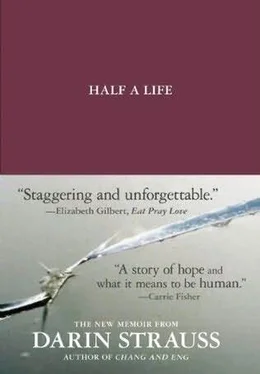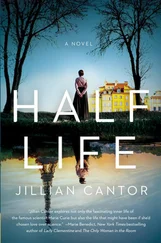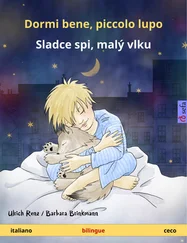Driving here, I’d found my hands and feet making certain decisions — figuring what I could and could not accomplish — before I was even aware of it. I’d taken certain back streets, going out of my way to keep from learning whether the quicker route had retained Celine’s vacant stare.
There was a mirrored wall. James Harmon and I stood just nodding at each other in front of it. We’d been pretty chummy back in the old corridors; it made this glass wall a desert’s covered tent, a safe spot to rest. We smiled. We each asked how the other was doing. (James’s skin had cleared up.) We smiled again. Drops of light twinkled in James’s glass. The cracks in old friendships are measured in awkward pauses.
A little later (after catching up with Jim, joking with Eric), I stood in front of the banquet hall’s sound system, next to some balding dude. We hung out there without speaking for a while, each not revealing that he didn’t know the other’s name; instead we just acknowledged that we were mutually experiencing something.
The dude leaned to me. “I hear that people are going to go to a bar that’s around the corner, that’s supposed to be a fun place.”
I showed agreement by raising my eyebrows. “The Clark Tavern,” I said. My hands I kept tented in front of my chin.
The dude’s baldness seemed to come from powerful thought: the hair slipping down the sides of the head, the brain pushing up on the skull like a fist stretching a balloon.
“I’ve thought about you sometimes, yo,” he said. “You’re the one who ran over that girl? This’ll sound weird. I’m just talking out loud here. But I worried about you. Everyone was very hard on you.”
Really? That wasn’t how I remembered it. I remembered what had seemed to be a big wave, and once I’d pushed through it, only flat calm sea, and people wanting to make sure I was floating all right.
“Were they hard on me?” I said.
“I really did, man. I thought about you a lot. Like a, What’s this guy going to do with this , kind of a thing. I was hoping I’d see you here.”
My face was burning. Or not burning, just suddenly huge and gawky. I needed to get this gawky thing away before I bumbled into somebody. So that’s what I tried to do now, with this dude: “Okay, then.” Nod, handshake, bye.
After that, every conversation was a swerve. I’d see people I recognized, move close, my courage would conk out, so I’d walk past. Their faces would form into a greeting and then congeal a little as I glided by. Was that Darin …?
I’d been wrong. Maybe these people could lay sprawled in their own nostalgia. But I couldn’t join them. My thoughts kept flying head-first into the pane of glass that kept me outside of everyone else.
“Oh, I don’t associate you with that ,” a woman named Kim told me a few hours later. By now the night was huffing and puffing toward the finish line.
She and I had stepped out onto the lawn. I had always really liked Kim in school, when she’d been the fluent, prim girl dating Jim. Kim had become a smoker — so there was that gentle distress of seeing people from high school practice adult vices without calamity — and it was because she’d headed outside to burn a cigarette that we now stood here in the cold, just beyond the door, where people expelled long, sighing, dry clouds.
“Thanks,” I said, “for saying that.” I was obliging too much. “Yeah, I remember you from a lot of different years, as well.” This was a case of my deliberately misunderstanding: and why? To make her clear it up. To make her say it again. Guilt makes you behave in ways that get you to dislike yourself, that make you go through more guilt.
She fired up another Marlboro Gold: match crack, instant light on lips, her bunched chin. “I mean, people I think know it wasn’t your fault.”
“Oh.”
“—or even think about it when they first see you,” she said.
“Well, good.” I nodded, only now recognizing the indiscretion of having brought it up.
She waved at the cigarette smoke in front of my face until it was gone.
At my most confident, I blush and my gaze veers. But when feeling unrecognizable, I’ll make sure to look you right in the eye.
“Thanks,” I said.
The whole wistful mass of us migrated to the Clark Tavern — carpooling in big noisy departures, that zip and lurch of a family van filled with high-schoolers who’d put on years like weight, but who remained their juvenile selves, after all: hooting out windows, greeting and upending the night. It was like rehashing graduation. We’d left a place that was only us, and entered the world’s tricky spots, where people didn’t know our stories and had to be approached with suspicion.
But hadn’t Kim said exactly what I’d wanted her to say? Why had there been no quick-focused humidity around the eyes, no stinging grateful rush? That my ex-classmates didn’t think about Celine even when they saw me scattered other ideas in my head. It was as if I knew less than I had when I’d left Manhattan to come back out here.
Inside the bar, everyone kept snapping photos, or they stared at one another, stares of real intensity — drawn out, blatant, ex-friend to ex-friend. They were hoarding new memories, images to last the decade until next reunion.
Kim had gathered some friends, women. We were all leaning forward — in the way of people at bars — straining to hear over music. (Mullet-rock, thudding from nearby speakers.) I was aware of other people’s hair very near my face, that warmth. Everyone was nodding.
“And nobody, nobody here anyhow”—Kim drew a little sundial in the air with her finger—“really knew what’s-her-name, the girl, since she wasn’t in our grade. Celine . So anyhow, our sympathies were with you.”
And nodding went around the circle again.
Part of reunions is reenacting the whirl of departure over and over. Every few minutes at the bar somebody would make a sloshy toast and then a dramatic exit: hugs, complicated handshakes, punching email addresses into cell phones. We’d become used to one another again and were saying goodbye again.
I don’t even know how I’d gotten Kim and her friends discussing the accident. Ten years on, talking about it remained a crackling horror. Probably, just by acting weird, I’d shown myself stained by the blemish of it. Whatever private anxieties we endure are, of course, never really private. Our own dissembling behavior guarantees their eternal, public return.
“Thanks,” I said. “But it’s just—” And why couldn’t I let it drop? All they’d done was agree to try to buck me up. I wanted to shout: Come on, someone died!
“Okay!” one of Kim’s friends said, clapping once to ring in a change of subject.
The nodding petered out. I was aware of people’s hair no longer being near my eyes. And it felt as if the music suddenly got louder again. The moment had lifted its gates from around us.
“Thank you,” I said, “all of you.”
“Don’t sweat it.” Kim tilted her thin, savvy face. I never want to talk about this again, her expression said.
The social-approval me — like the smoke that Kim had earlier waved from my face — seemed to just go poof!
And now I was the one gushing my way down the bar, handshaking, hugging, giving out my business card, getting it confused with other people’s, so that a few times the card I gave out was someone else’s and we had to reexchange. Maybe some friendships had been relit here, but I doubted it. What was said between this group who had been the stars of each other’s lives had been said already, or wouldn’t ever be said.
The bald dude I’d stood next to in the reunion hall was moping in a corner: hand around a plastic cup, beer slobbering down his knuckles. This guy looked handsome in a diminishing way. Ignore all the scalp and some excess under the chin and he could still have been eighteen. He kept staring at the mirror behind the taps, and that’s where our eyes caught.
Читать дальше









